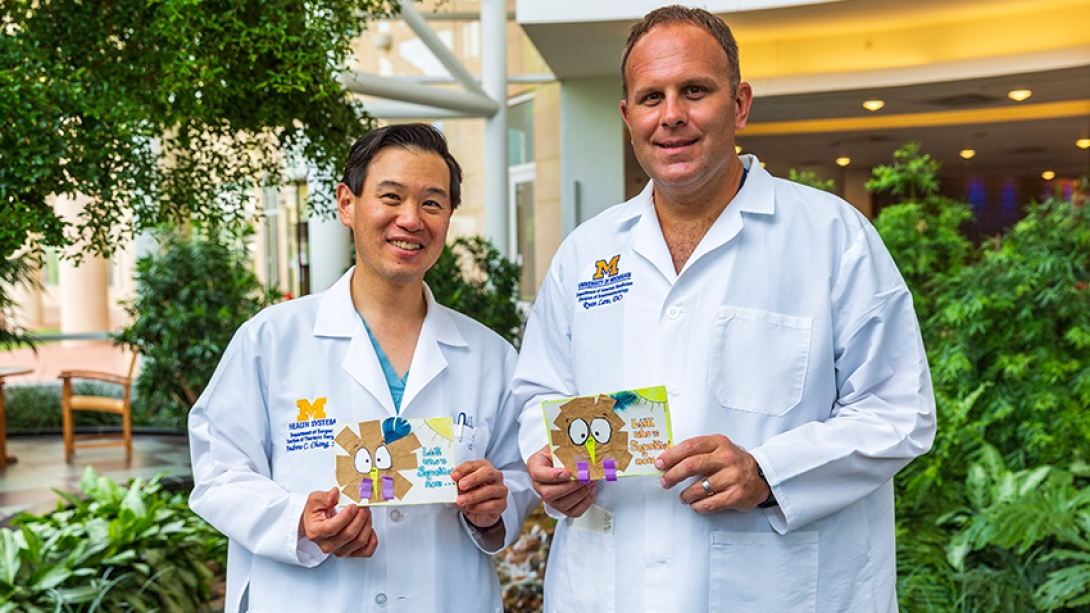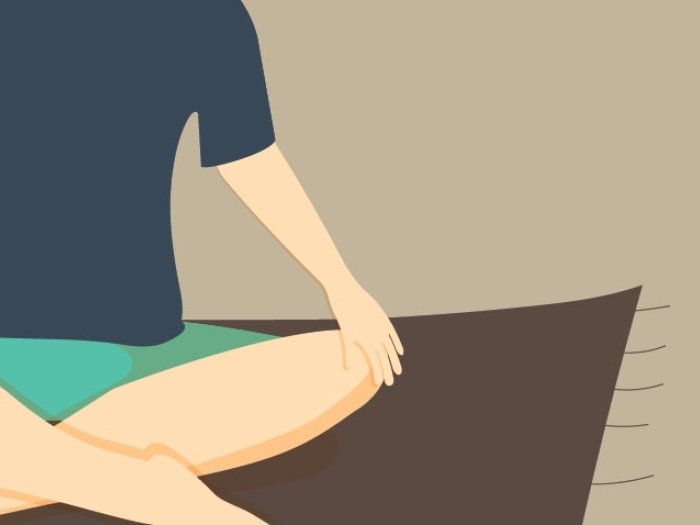Dramatic weight loss, chest pain and difficulty eating eventually led on Upper Peninsula man to Michigan Medicine, where he received a revolutionary new surgery.
7:00 AM
Author |

John Wils sounded like a sewer pipe in his sleep. There was a thunderous churning stemming from what his wife, Pamela, thought was his stomach.
ASK ALEXA: Add the Michigan Medicine News Break to your Flash Briefing
But the cause was ingested food and liquids caught in his esophagus.
Wils, 67, was soon diagnosed with achalasia, a rare disorder when the nerves in the esophagus degenerate — causing the muscle to stop working, preventing the normal emptying of food into the stomach, thereby leading to regurgitation, chest discomfort and, in some cases, weight loss.
Otherwise healthy, Wils abruptly developed every symptom: difficulty eating, sleep disruption because of regurgitation, pain in his chest and substantial weight loss — about 35 pounds in less than two months. His 5-foot, 11-inch frame went from 175 pounds to 140 pounds.
He vomited everything he put into his mouth, even sips of water.
"He was dying in front of my eyes," says Pamela Wils.
The couple visited hospitals near their Upper Peninsula home before a gastroenterologist in Marquette, Michigan, told them about a new surgery that could fix his issue. Michigan Medicine was one of only a few hospitals in the state performing peroral endoscopic myotomy (POEM).
POEM is a scarless, minimally-invasive procedure completed during an upper endoscopy rather than through an incision, offering a quicker recovery without stitches. A scope passes through the mouth to the lower esophageal sphincter, where an endoscopist alters muscle fibers to open the sphincter, allowing food to pass through to the stomach due to gravity.
Pamela Wils quickly booked an appointment and packed her husband into the car for the seven-hour drive from Rapid River to Ann Arbor.
Options to treat achalasia
Michigan Medicine gastroenterologist Ryan Law, D.O., and thoracic surgeon Andrew Chang, M.D., met with the couple in mid-January and scheduled the procedure for one month later.
MORE FROM MICHIGAN: Sign up for our weekly newsletter
"John is a stoic individual and downplayed what he experienced, but we knew he had been through a lot to get to this point," Law says.
Wils had led an active life on the shores of Lake Michigan. The retired operating engineer, who steered back hoes and other construction equipment for a living, is a fisherman, house painter and dog walker for three golden retrievers, averaging 5,000 steps a day.
Achalasia robbed him of nutrition and the energy he got from food.
The disorder affects 3,000 people in the United States annually and can strike anyone at any age. While there is no cure for achalasia, treatments like POEM help patients return to health.
Wils had received a Botox injection from his Marquette gastroenterologist to relax the muscles of the lower esophageal sphincter. But Botox only affords three to six months of relief, in many cases. Another temporary treatment, pneumatic dilatation, involves using a balloon to dilate and stretch the muscles of the lower esophagus.
Before POEM, a Heller myotomy was the surgical standard treatment. It's a similar procedure where the muscles of the esophagus are cut laparoscopically via several small incisions in the abdomen, Law says.
Wils only concern going into the procedure? That the doctors said he might remain unable to eat two of his favorite foods to grill: steak and pork chops. "I knew I'd be able to eat them someday," he quips.

Andrew Chang, M.D., and Ryan Law, M.D., show off their homemade cards from Wils' wife, Pamela. She creates cards every week for her friends, family and customers. "The card was special because they saved John's life. We are so thankful," she says.
POEM preparation and recovery
The month before the procedure, Wils lived carefully. The doctors feared he may get the winter's wicked Influenza A, which could postpone the surgery, so they suggested he avoid others who may have germs.
The couple skipped church and avoided their traditional Saturday night dinner with friends. Ice fishing and their hot tub became their sources of relaxation.
SEE ALSO: Aging and Digestive Health: 6 Factors to Watch For
Three days before surgery, Wils replaced food with liquids to prepare.
A typical POEM takes 90 minutes to complete, Law says. Wils' procedure was nearly two-and-a-half hours.
"His anatomy was somewhat odd, with thicker muscle than we normally see in the distal esophagus. We almost quit during the procedure until we re-evaluated what we had done and readjusted to work with his anatomy," Law says. But in the end, it went well.
After the procedure, Wils reported no pain and walked the hospital halls until he left the following day, after swallowing contrast for an X-ray study to make sure everything was working. POEM patients should only have clear liquids the first day, full liquids for the next three days, and then only soft, mushy foods until a clinic follow-up appointment 10 to 14 days later for most patients, a month in Wils' case.
Because Wils lives seven hours away, he had a video conference follow-up with Dr. Chang while with his family health care provider, who did an exam and blood work.
He was prescribed Prilosec to treat acid reflux. Wils will take it for at least the next six months.
Just three days after surgery, Wils was feeling so well he was able to rip out the floor at his mother-in-law's house.
After a few weeks, he returned to a regular diet. By St. Patrick's Day, Wils was ready to try his luck. What was on the menu? T-bone steak, the dense meat the doctors warned him about. He grilled on his deck, and ate it.
Law cautions this may not be the case for everyone. "Patients may never tolerate a totally normal diet, and certain foods may still be difficult." But he's happy to hear about Wils' good luck.
Wils can't recommend the procedure enough. He's already gained back 25 pounds.
"Life is fantastic," Wils says. "This procedure? It's a miracle."
To schedule an appointment to discuss POEM with a Michigan Medicine gastroenterologist, call 888-229-7408.

Explore a variety of healthcare news & stories by visiting the Health Lab home page for more articles.

Department of Communication at Michigan Medicine
Want top health & research news weekly? Sign up for Health Lab’s newsletters today!





